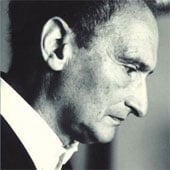
Victor Fenigstein
Came from a Jewish family, which, having been expelled from Wroclaw, settled down in Zurich * at a young age enthusiasm for the violin, then piano lessons with Emil Frey * winner of the competition for the position of professor for piano at the Luxembourg Conservatoire in 1948 * in 1952, Fenigstein was diagnosed with Multiple Sclerosis, which put an abrupt end to his career as a pianist * afterwards he turned towards composition, where his skills were primarily self-taught * at first, his idols were Schumann and Beethoven, then, in later years, Schoenberg’s student Anton Webern, Béla Bartók, and Dmitri Shostakovich * many of his compositions were responses to current events * the cantata Et le jour se leva pour lui (1953) was a reaction to the ongoing Cold War; Etudes concertantes "i muratori" (1967) was sort of a requiem for the guest-workers, who died in the mining disaster of Marcinelle; with Seventeen Millions (1979) Fenigstein wanted to draw attention to the starvation death of yearly seventeen million infants * despite severe illness he completed the three-hour works Die heilige Johanna der Schlachthöfe and settings of the complete 154 Shakespeare sonnets * afterwards publication of several works with reduced scoring, e.g. Die Ballade vom Reichtagsbrand with texts by Bertolt Brecht and Eight melodies without words and seven variations
Works by Victor Fenigstein include:
Memento et épitaphe pour saxophone alto et piano (1981)
Die heilige Johanna der Schlachthöfe (1982–1984) songplay in 5 acts for the operatic stage
Musikalische Augenblicke (Die Amsel) (2003) for large orchestra
"By no means did I want to belong to the so-called avant garde. My main concern was to be a witness of my century." — Victor Fenigstein
